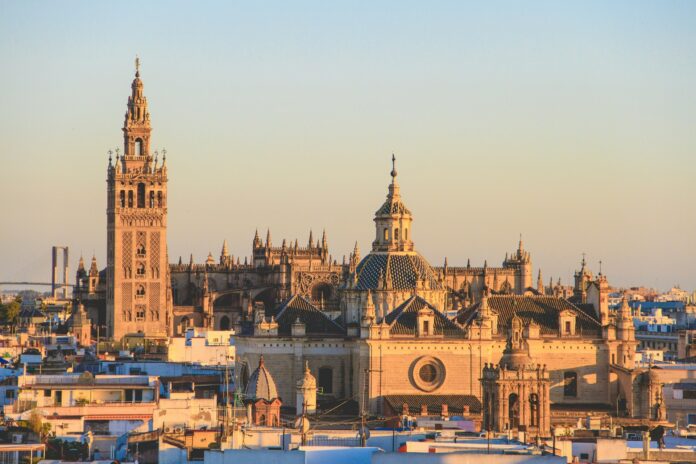Easy access to Seville’s top attractions by foot makes it a prime destination for travellers seeking cultural immersion
Seville, celebrated for its rich history and vibrant culture, has been declared the most walkable city in Spain. A recent study by Preply places Seville at the top of Europe’s most pedestrian-friendly cities. Tourists can enjoy the city’s main attractions, all located within a mere 20-minute walk from each other, making it an ideal destination for those looking to explore on foot.
The city’s allure is enhanced by its status as one of Europe’s sunniest destinations, offering a warm welcome to visitors year-round. The Plaza de Espana, a favourite among tourists, allows visitors to take a boat around the iconic square, although upcoming fees could change how tourists experience this landmark.
Embed from Getty ImagesSeville’s Gothic Cathedral, a few steps from the Plaza, tells a tale of architectural magnificence with its Moorish and Christian influences. Nearby, the Royal Alcazar stands as a testament to medieval Islamic architecture, with its stunning gardens often selling out tickets due to high demand.
Wandering through the Barrio Santa Cruz, visitors can lose themselves in the enchanting narrow streets of Seville’s historic heart. The neighbourhood is ripe with hidden cafes and tapas bars, perfect for a gastronomic pit stop. Seville claims to be the birthplace of tapas, offering culinary delights like braised beef cheeks and fried fish, which are essential for any food lover’s itinerary.
Analysis
From a political perspective, the walkability of Seville not only enhances its appeal as a tourist destination but also encourages sustainable urban tourism practices. This focus on pedestrian infrastructure can serve as a model for other cities aiming to reduce vehicular traffic and pollution.
Sociologically, exploring a city on foot allows for a more immersive experience, fostering a deeper connection with the local culture and community. It can also significantly enhance the local economy by increasing the amount of time and money tourists spend within the city.
Economically, the recognition of Seville as a walkable city can attract more tourists, which in turn boosts local businesses, especially in the hospitality and retail sectors. Such accolades can also lead to increased investments in maintaining and improving the city’s infrastructure.
Locally, Seville’s residents benefit from the city’s pedestrian-friendly layout, which contributes to a higher quality of life and lower transportation costs. Moreover, the compact nature of the city encourages community interactions and a vibrant street life.
The gender dynamics in tourism often highlight safety concerns, which walkable cities like Seville can address by providing well-lit, busy streets populated with both locals and tourists. This can make the city more appealing to solo female travellers.
Lastly, while race and minority issues are not directly impacted by city walkability, the inclusivity of public spaces can encourage a diverse range of visitors, fostering multicultural exchanges and understanding.
